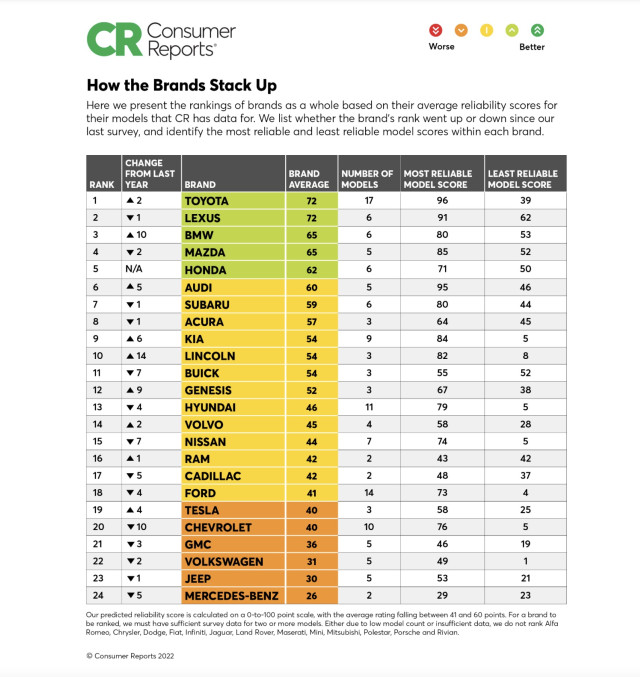Hybrid vehicles and sedans are the most reliable cars, while electric vehicles and pickup trucks pose the most problems for new car owners, according to respondents of a Consumer Reports study announced Tuesday.
In its annual consumer survey based on more than 300,000 vehicles from the 2000-2022 model years, the consumer advocacy publication predicted that Toyota and Lexus are the most reliable brands for 2023, while Mercedes-Benz fell to the least reliable of the 24 automakers assessed.
The predictions are based on car owners reporting problems in 17 categories ranging from transmission issues to in-car electronics during the last 12 months, which is then used as the basis to assess model reliability over the past three years.
Hybrid advantage
New this year, Consumer Reports analyzed hybrid cars separately from their gas-only counterparts, so the Toyota RAV4 was broken out separately from the RAV4 Hybrid. In doing so, Consumer Reports found that hybrid vehicles were as reliable or more reliable than their gas counterparts despite the fact that hybrids can have more mechanical complexity.
In many cases, hybrid power systems have been worked out over time and can reflect packaging advantages over internal-combustion cars. Some AWD hybrids lack a drive shaft and instead have a rear motor powering the rear axle, for example. In other cases, an electronic CVT has fewer potential problems than newer 8- to 10-speed automatic transmissions utilized in combustion engines to eke out more fuel savings. There are also fewer brake problems reported in hybrids.
“Hybrid tech is not new to these automakers,” Jake Fisher, senior director of auto testing at Consumer Reports, said in an online presentation hosted by the Automotive Press Association. “It’s been around for two decades at this point so it’s pretty proven technology.”
In many cases, hybrid vehicles aren’t loaded with all the latest and greatest in-car technology, as is the case with clean-sheet EVs that introduce everything from new drive systems to new infotainment setups and even new steering wheel designs and door handles, all of which have the likelihood of causing more problems.
Plug-in hybrids have slightly more problems than hybrids due to charging issues, as well as heating and cooling issues, Fisher said.
Hybrid cars and SUVs were two of the three most reliable segment categories, whereas electric vehicles ranked second to last, according to Consumer Reports. Pickup trucks ranked worst in overall reliability, which goes against perceptions of long-lasting trucks in an evolving truck segment.
“These days pickup trucks are luxury vehicles, they aren’t these simple machines anymore,” Fisher explained, referencing everything from manual windows to basic AM/FM radios and 6-speed automatics in the last generation of trucks. “They’re large powerful luxury vehicles and there are a lot of problems associated with that.”
Those problems include powertrain issues with features such as cylinder deactivation as well as digital instrument clusters and large touchscreen electronics. This corroborates other reports from J.D. Power that in-car technology and connectivity issues, such as with Apple CarPlay, continue to be the biggest problem for new car owners.
Problems with the powertrain and in-car technology afflict the Chevrolet Silverado pickup truck, and contribute to Chevy’s big drop of 10 spots since last year to become the 20th most reliable brand out of 24 that were assessed, with a brand average that ranks the same as Tesla.
Fisher noted that not every problem reported by an owner is weighted the same, unlike J.D. Power’s Initial Quality Study.
“Any type of problem that could leave the vehicle incapacitated or major powertrain problem rated much more heavily,” he said. “Infotainment or electronic systems are not weighted very heavily. In some cases they are, because certain automakers put everything in their screen, but in most cases these systems can be remedied quite quickly, so unlike a transmission or an engine which may take years to work out the bugs.”
Electronic problems can often be remedied with software updates, Fisher said, so Consumer Reports doesn’t predict bad reliability after “just a handful of electronic problems.”
 Consumer Reports 2023 brand reliability list
Consumer Reports 2023 brand reliability list
On brands
Steady introductions of new technology across the product line is one of the reasons Toyota and Lexus took the top two spots in brand reliability yet again this year. The world’s largest automaker takes a more incremental approach, then gradually applies it across its lineup.
“These are brands that aren’t adding a lot of new technology and they have a lot of shared componentry among vehicles and platforms,” Fisher said.
New vehicle introductions with new technology affects reliability. Redesigned for the first time in 15 years, the 2022 Toyota Tundra debuted with two new powertrain options and a slew of technological updates. The full-size pickup truck is the only Toyota to rate below average due to body leaks, hardware issues, and trim complaints.
BMW jumped 10 spots to rank third overall, in part because they haven’t launched that many new products recently and they’ve simplified their iDrive infotainment system, Fisher said.
Mazda, Honda, Audi, Subaru, Acura, Kia, and Lincoln rounded out the top 10 in that order, with Lincoln and its small lineup taking a huge jump in the reliability rankings in becoming the only domestic brand to crack the top 10. Domestic brands lack consistency.
“The big difference we’re seeing with Asian brands at the top is that they are very consistent (with platforms and technology). We don’t see that with domestics,” Fisher said. “We see larger changes with a lot of their vehicles, and many different platforms.”
Mercedes-Benz is the least reliable brand for the first time in CR’s rankings, coming in last of 24 automakers. Not only has the brand launched its EQ electric vehicle family this year, it has recently rolled out its massive Hyperscreen that includes three screens under a single pane of glass stretching 56 inches.
“Owners report problems with the in-car electronics such as screen freezing or going blank, and sometimes requiring hardware replacement,” Consumer Reports said in a statement.
Tesla improved 4 spots to 19th, while Chevrolet, GMC, Volkswagen, and Jeep filled out the bottom dwellers between Tesla and Mercedes.
Accounting for more than half of the EV market assessed in the study, Tesla has different reliability problems than other automakers and other electric vehicles. Tesla issues revolve around body hardware, paint and trim, and steering and suspension. Electric vehicles by other automakers have reliability issues with the battery pack, electric charging, and electric drive motor issues. Both sets of EV makers had reliability issues with the climate system and in-car electronics.
“We’re seeing the types of problems that have been worked out by other automakers that have been around for 100 years,” Fisher said of Tesla. “What we don’t see with Tesla are a lot of problems with electric powertrains. They’re actually better in that than most other EV brands.”
Related Articles
- 2023 Honda Accord leans into hybrid advantage
- 2023 Honda Accord, Volvo EX90 headline this week’s new car news
- Test drive: 2023 Kia Niro blends crossover style and 49 mpg
- Test drive: 2022 Toyota Sienna Woodland leans on rugged style
- 2023 Kia Sorento costs $31,285; plug-in hybrid is $51,185










